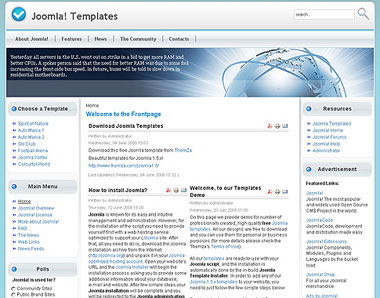Website
One of the most common reasons for us to be hanging around on the Internet every day is the abundance of information it is loaded with. The information is generated by multiple sources and is carefully organized in the form of files and web pages, which, when grouped together to form a single entity, become a website.
The Website
In this sense, a website represents a centrally managed group of web pages, containing text, images and all types of multi-media files presented to the attention of the Internet users in an aesthetic and easily accessible way. All websites enabled through the Internet constitute the World Wide Web (WWW).
An example of Joomla Website
The data contained in the websites is organized and made accessible to the online public with the help of programming languages such as (X)HTML and PHP, just to name a few. Website programming is the main method of defining the structure of a website and managing its behavior as visitors browse through its pages. With the help of web design techniques, the well-structured information is given a user-friendly look & feel. In order for the properly programmed web pages to be presented on visitors' monitors, they need to be hosted on a web server, which will allow them to be transferred to any web browser via HTTP, the main protocol of the WWW and the 4-letter abbreviation we see at the beginning of each website name.
Visiting websites
Visitors can access a certain website by simply typing its name in the address bar of their web browsers. Website names are made up by their owners and represent an easy-to-remember combination of letters and numbers, more popular as domain names or sub-domains. When you visit a website, you just use the site's domain name, with the Domain Name System (DNS) taking care of placing the domain on the specified web hosting server. Depending on the purpose it serves, a website could be owned and administered by an individual, an organization or a company.
Website elements
The remarkable progress in website creation technologies and the limitless capabilities of the human imagination has determined the great variety of websites we see today on the web. However, they all contain some basic elements that make them easily recognizable by users in terms of functionality - a home page (also known as index page), the first page we see when entering a site; a navigation menu - the main guide to the website's contents; a footer area with important links, copyright information, etc. With the help of hyperlinks the visitor is taken from one web page of a site to another in a logic-driven way, which considerably increases the website's usability.
Static and Dynamic websites
The creative concept and software behind a website determine whether it is static or dynamic. Static websites present the information online to the visitor in a straightforward way - as it is stored on the server. A good example of a static website is each simple company website providing details about the company's portfolio, contacts, future projects etc. Its setup usually requires some basic website skills and knowledge of HTML and CSS. Dynamic websites, in turn, use databases to store and handle the information, which allows the web pages' content to be changed automatically in certain pre-defined cases. A dynamic website is, for instance, every portal, blog, or e-commerce store you may visit daily. The list of dynamic website software is much longer, including - PHP, JSP, Perl, ASP and many more.
The PHP website
PHP is one of the most popular tools for website creation. This scripting language is easy to learn and gives the coder great possibilities to create his website and also give it advanced functionality. PHP websites constitute the majority of the personal websites today. PHP is also the scripting language of choice for most of the popular blog, forum or ecommerce sites. It is also easily combined with databases, such as MySQL and PostgreSQL, which allow for the data to be kept and organized in an easily accessible manner.
Websites with NTC Hosting
NTC Hosting was founded for one purpose - to provide affordable web hosting offers and give its users all the tools necessary to create their own site fast and easy. With each NTC hosting plan our clients can use our in-house developed script installer tool, with whose help they can install more than 30 popular php scripts in under a minute. Users can also take advantage of our website builder - the Site Studio - a template based online site creator, making website design and creation something everyone can handle.
